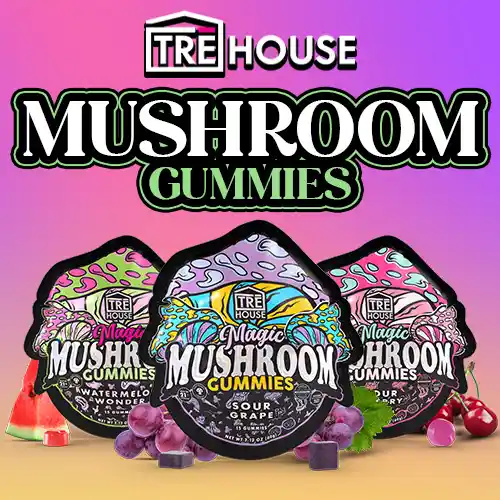
Do Magic Mushrooms Show Up on a Drug Test? (asking for a friend)
Do psychedelic mushrooms show up on a drug test? What do they show up as, and how long do they stay in your system? Asking for a friend, of course.
To be clear, we’re not talking about your portabella sandwich, and we’re also not talking about the Reishi or Lion’s Mane that come in your instant latte mix.
Psychedelic mushrooms, commonly called magic mushrooms or simply “shrooms,” refers to multiple species and varieties of fungi with hallucinogenic properties. These are used recreationally, therapeutically, and even ritualistically to achieve a mystical experience. In fact, the use of magic mushrooms predates recorded history in many parts of the world.

However, given the current legal status of shrooms, your friend has good reason to wonder if shrooms will show up on a drug test. The active compound in shrooms, called psilocybin, is classified as a Schedule I drug under the Controlled Substances Act of 1970.
In the past five years, there have been some changes in the legal status of psilocybin. With renewed interest in the therapeutic and medicinal potential of this compound, it has been decriminalized in some cities. Decriminalization is not the same as legalization, however, and psilocybin remains illegal in most US states. Although some states may be moving towards legalization, psilocybin is still going to remain a highly regulated drug.
Do Mushrooms Show Up on a Drug Test?
The short answer is that shrooms are not in a standard drug panel. In other words, if you are getting routine drug testing done, shrooms are unlikely to show up. There are several reasons for (and caveats to) that, which we’ll get into. But first we’ll require some background knowledge.

Let’s start with an important distinction. Magic mushrooms may not show up on a drug test for two reasons.
1. Because the test doesn’t specifically look for markers of mushrooms.
2. Because the chemical markers of mushrooms are short-lived in the body.
In this case, it’s a little bit of both. Let’s start by looking at the first point: mushrooms don’t show up on a standard drug panel for the simple reason that the test doesn’t look specifically for them.
The gold standard in analytical chemistry is chromatography (a separation technique) combined with mass spectrometry (a detection method). Technically, analytical chemists can perform a “full scan” with mass spectrometry to show them “everything” that is in a biological sample.
However, the full scan approach sacrifices the sensitivity of the test. It makes more sense to tell the instrument exactly which molecules to look for. Biological samples like urine and plasma are notoriously complicated. You might not find certain low-concentration compounds unless you look for them specifically.
So, if an analytical chemist had reason to believe that your friend had consumed magic mushrooms, what chemical markers would they look for?

What Do Mushrooms Show Up as on a Drug Test?
There are two compounds that put the “magic” in magic mushrooms: psilocybin and psilocin. Psilocybin might be a little bit more famous, but once consumed it rapidly turns into psilocin. Psilocin is actually the primary compound responsible for the biological activity of magic mushrooms.
The difference between the two compounds is slight – psilocybin simply has an extra phosphate group, which is easily shaken off. This transforms the water-soluble psilocybin into a fat-soluble psilocin. Why is this important? Because this fat-soluble compound can more easily cross the blood-brain barrier. Once psilocin gets into your friend’s brain, it can work its “magic.” Or more specifically, it can interact with the serotonin receptors of the brain to induce a hallucinogenic effect.
Eventually, psilocybin and psilocin break down into a few other metabolites as well. The whole family of compounds gets excreted through the urine. By that time, there is only 3-10% of the original psilocybin remaining. Most of it reacts with glucuronic acid (a metabolite of glucose) to create a “conjugate.”

So, an analytical chemist might check your friend’s urine sample for psilocybin or psilocin. Better yet, they could look for the glucuronide derivative. Or, they can perform a reaction that would convert the derivative back to psilocybin before they run the analysis. They can also see the psilocin in the blood itself.
It’s still possible that psilocin can cause a positive result in a regular drug test. As we mentioned before, chromatography – mass spectrometry methods are the gold standard for analytical chemistry. And the technology keeps improving. Nowadays, there are high resolution mass spectrometers that are also highly sensitive. That means they have a much better chance of finding something in a sample, even if they aren’t specifically set up to look for it.
Which brings us to our next question…
How Long Do Shrooms Stay in Your System?
If your friend already has consumed mushrooms, how much time needs to pass before he/she has a clean drug test?
We already said that psilocybin and its relatives are removed from the body via the urine. The rate at which psilocin is removed depends on the person, but in general the elimination half-life is about 3 hours. That means that in 3 hours, the concentration of psilocin will already be reduced by half. Within 24 hours, it will be almost entirely gone – although it is possible in some cases to detect very trace amounts even after a week.

How Long Do Mushrooms Show Up on a Drug Test?
Based on what we’ve talked about, we now know that the best chance of detecting magic mushrooms on a drug test is by collecting a sample while your friend is still under the influence.
But there’s something else to consider too. Even if we collect a urine or blood sample while psilocin is at peak concentrations, we also have to consider the stability of the psilocin in the sample. Some researchers have shown that psilocin is stable in processed samples for up to 26 hours, when stored in a chilled autosampler. But when the samples are stored at room temperature, 90% of the psilocin degrades within a week.
Freezing the samples is actually counter-productive as well, since it leads to rapid (but unpredictable) loss of psilocin. It’s possible that an enzyme is released during the freezing process which breaks down psilocin.
The best method the analyst can perform is to collect a sample in the first 24 hours that your friend consumed mushrooms, and then keep that sample stored in the refrigerator with a preservative for no more than a week before performing mass spectrometry.
Here’s a little side-note: just because mass spectrometry is the gold standard doesn’t mean it is always used for drug testing. It is often easier and cheaper to use assays, which are specifically designed to signify the presence of a specific drug.
For example, in one case report, a man who had driven off the road and into a light pole was tested using an immunoassay. The immunoassay came up positive for amphetamine. However, mass spectrometry confirmed that he was negative for amphetamine/methamphetamine. When he admitted to the nurse that he had consumed magic mushrooms, they were able to identify psilocin in his urine sample.
So what happened there? The immunoassay had cross-reactivity with psilocin of about 1.3%. The presence of psilocin made it look like he had amphetamine/methamphetamine in his system, even though he didn’t. A more reliable analysis using mass spectrometry was able to verify that it was psilocin and not amphetamine in his urine sample.

The Take-Away
All that is to say that magic mushrooms are not usually a target in standard drug tests, but that doesn’t mean they can’t be. Analytical chemists can identify the active compounds in psychoactive mushrooms up to a week after consumption.
However, psilocin is excreted from the body fairly quickly and is relatively unstable in biological samples during storage. It is unlikely to show up in a drug test after a week, especially if the analytical method is not specifically designed to find it.
Our mushroom products definitely won’t show up on a drug test since they don’t contain psilocybin. Feel free to share the link with your friend. And as always, you can contact us for a free consultation.
Remember: if your mushroom product contains THC, it WILL show up on a drug test. Make sure to read the COA of your products!









